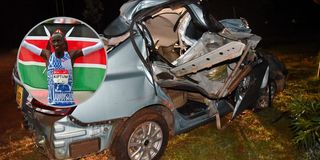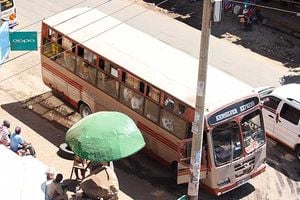Improve road safety in honour of Kelvin Kiptum

The vehicle which World Marathon record holder Kelvin Kiptum (inset), his Rwandese coach Garvais Hakizimana and another occupant were traveling in before they were involved in a fatal road crash on the Eldoret-Eldama Ravine road on February 11, 2024.
What you need to know:
- The world braced itself for Kiptum's sub-two-hour attempt in the Rotterdam Marathon in April and the ultimate showdown with Kipchoge at the Paris 2024 Olympics in July. Sadly, it wasn’t to be.
The recent loss of world marathon record holder Kelvin Kiptum has left a gaping hole in the hearts of many.
Kiptum and his Rwandan coach Gervais Hazikimana died in an accident in Flax area along the Eldoret-Ravine Road in Elgeyo Marakwet County on February 11.
A young and promising marathoner, Kiptum was a rising star in his field with the world at his feet. Still, his untimely departure has not only saddened those who knew him personally but has also left the world in mourning.
He was striving to push boundaries and achieve greatness, following in the footsteps of legendary long-distance athletes such as Douglas Wakiihuri, Paul Tergat and Eliud Kipchoge.
The world braced itself for Kiptum's sub-two-hour attempt in the Rotterdam Marathon in April and the ultimate showdown with Kipchoge at the Paris 2024 Olympics in July. Sadly, it wasn’t to be.
The commitment and fortitude required for long-distance running is truly awe-inspiring as it requires stoicism and grit, enduring long solitary runs and a strict diet, not to mention the isolation from family during training.
It is this relentless pursuit of greatness that I admire most in runners. The ability to push oneself physically and mentally is not a quality everyone possesses. It takes a special person to endure the pain and exhaustion of long-distance running and yet continue to strive for improvement with unwavering dedication.
In contrast, I couldn’t survive six miles, even with a bounty of chocolate dangled at the end of a stick.
Kiptum’s death not only impacts those who knew him but also serves as a sobering reminder of the dangers that road accidents pose to individuals, especially those who are influential in their respective fields.
His passing has sparked a profound wave of mourning and reflection within the running community and beyond, shedding light on greater awareness and the need for action to address road safety.
Road accidents have become a pervasive and tragic reality for many individuals and families across the world. The impact of these incidents extends far beyond the victims, as nearly everyone knows someone who has been affected by a road tragedy.
Ramifications of fatal collisions are profound, both financially and emotionally, for the families left behind.
Furthermore, the burden on the state in providing health and social care for survivors with life-changing injuries is substantial.
It is clear the current deterrent is inadequate, and a more stringent approach is necessary to address this pressing issue.
Concerted efforts must be made to enhance measures for road safety and reduce this devastating impact on our society.
Road accidents are perceived as unavoidable events, but the truth is that the majority of these collisions are caused by human behaviour, factors such as speeding, driving under the influence of drugs and alcohol, fatigue and poor judgement.
These accidents can be avoided by taking a more responsible approach to driving.
Just as a pilot ensures the safety of their aircraft and departure time, car drivers must also take responsibility for their actions.
It is important to recognise the impact of our choices by committing to driving within speed limits, avoiding driving under the influence, taking regular breaks and making thoughtful and informed decisions whilst on the road.
The alternative solution to this chronic problem requires a united effort from drivers, the Ministry of Transport, Health, and the Police to address the challenges:
The high number of seriously injured patients delivered to hospitals by members of the public or police underscores the need to train our community and police in first aid. Untrained individuals attempting to remove a patient from their vehicle can inadvertently exacerbate their injuries, particularly in cases involving spinal injury. A fully trained team at nominated general hospitals can be trained to deal with trauma patients.
Police can suggest speed cameras in high-speed areas on highways outside the city, improve road signs' clarity, create rest areas for heavy goods vehicle drivers, impose hefty fines for speeding, and revoke licences for dangerous driving as a deterrent.
Road awareness courses should be mandatory for those caught speeding. Many drivers fail to keep up with highway regulations after passing their test. Implementing a cost fee for those courses would be beneficial. Even competent drivers may not understand road signs, so a road awareness course will help. Income generated from speeding fines can be utilised for road improvements and enhanced safety measures, such as infrastructure and installation of speed cameras and signs, all of which will ensure roads are safe.
Speeding may seem like a way to save time, but in reality, it doesn’t. For instance, driving on a 70mph speed limit road, If one decides to ‘kanyaga mafuta’ to 80mph, one gains 10 miles in one minute at the cost of possibly more fuel, so the mathematical theory of speed continues
Considering the realm of charitable endeavours and large-scale organisations, the potential investment in a medical helicopter with volunteer pilots for emergency medical care is worth considering. Time is crucial in medical emergencies and a helicopter with volunteer teams can make a difference between life and death. Helicopters can reach remote and hard-to-access locations, providing swift transportation to hospitals for patients in need of immediate care. The current flying doctors cater for those who can afford the costs, but we should strive to provide life-saving care to all walks of life. While the financial implications of investing in and maintaining a helicopter are significant, partnering with major corporations and charities can help bridge the gap in emergency medical care. With dedicated humanitarian efforts, this initiative has the potential to make a meaningful impact.
Wananchi, let's come together and be responsible while driving.
Drive safe.
SK Day is a sports enthusiast and a tireless advocate for change, brought on by the tragic loss of a loved one on the road. A passionate campaigner for road improvements.




